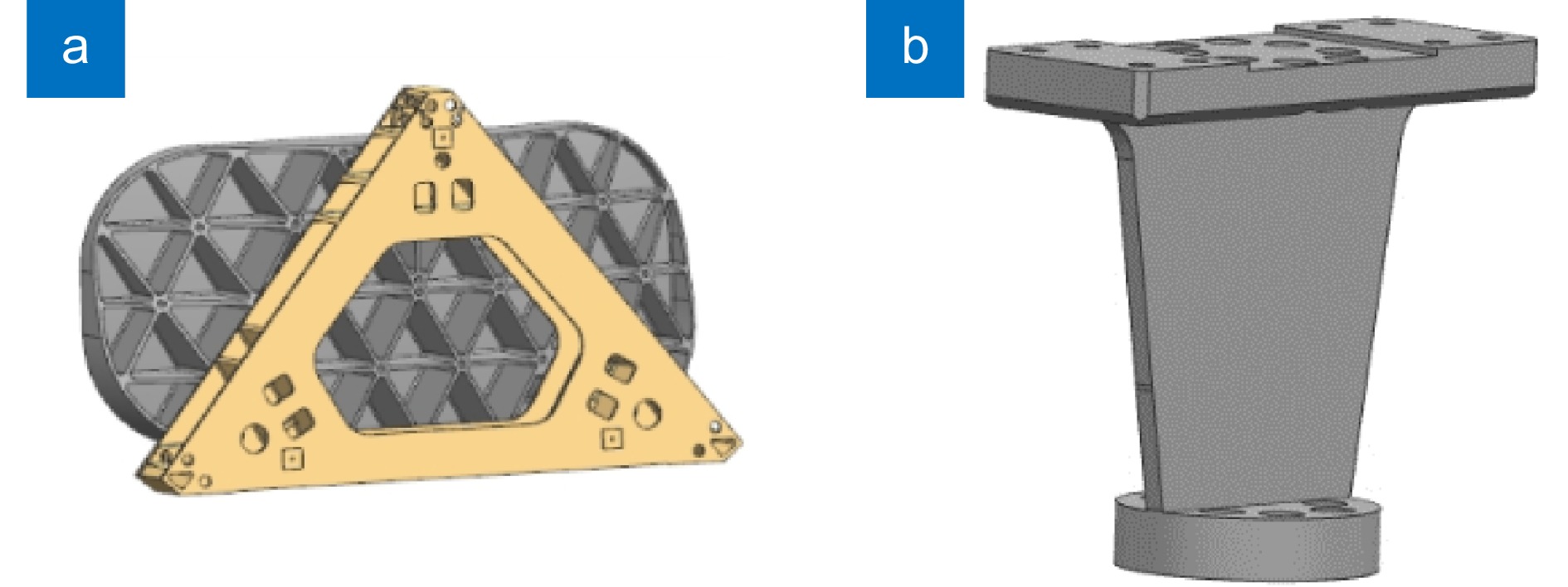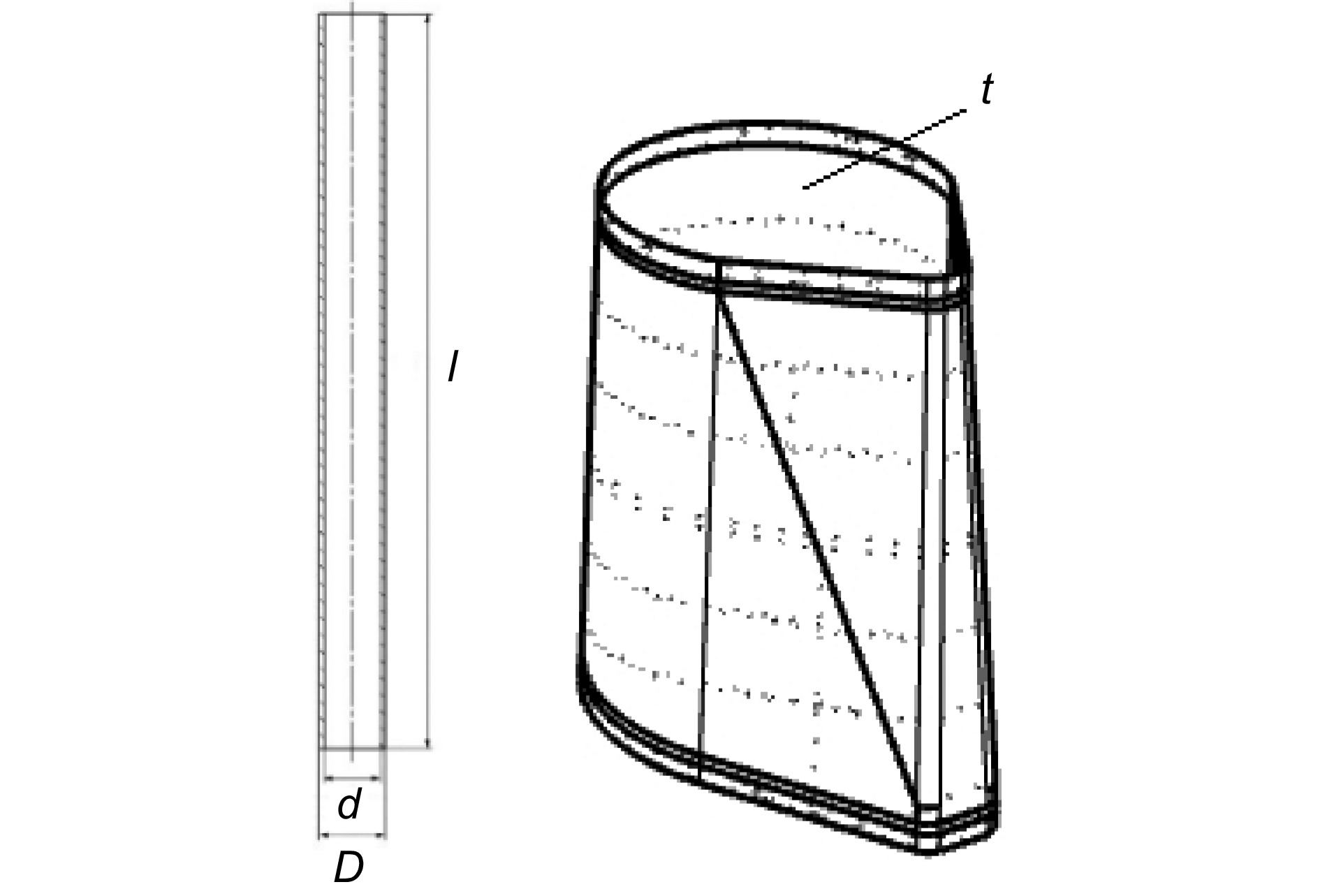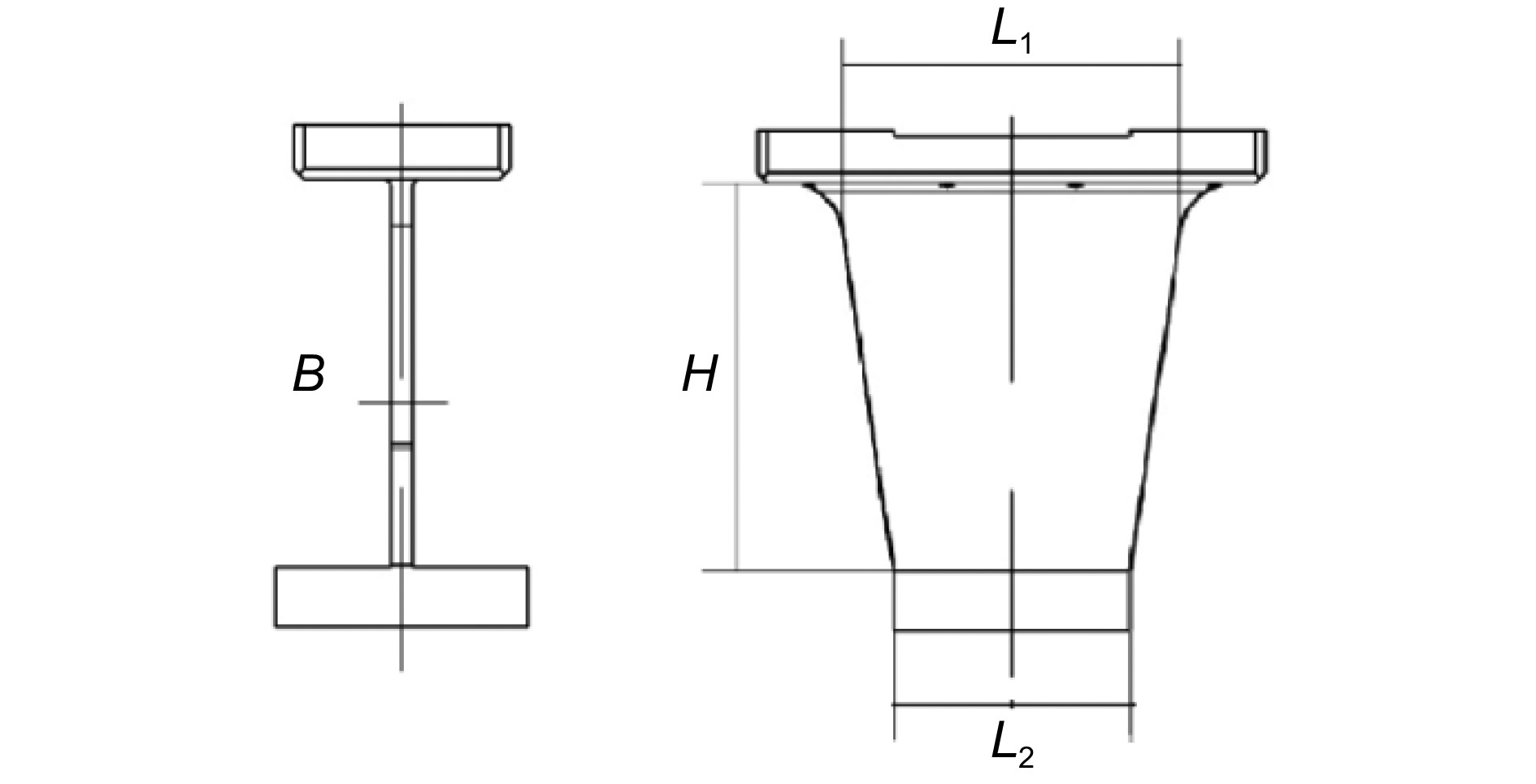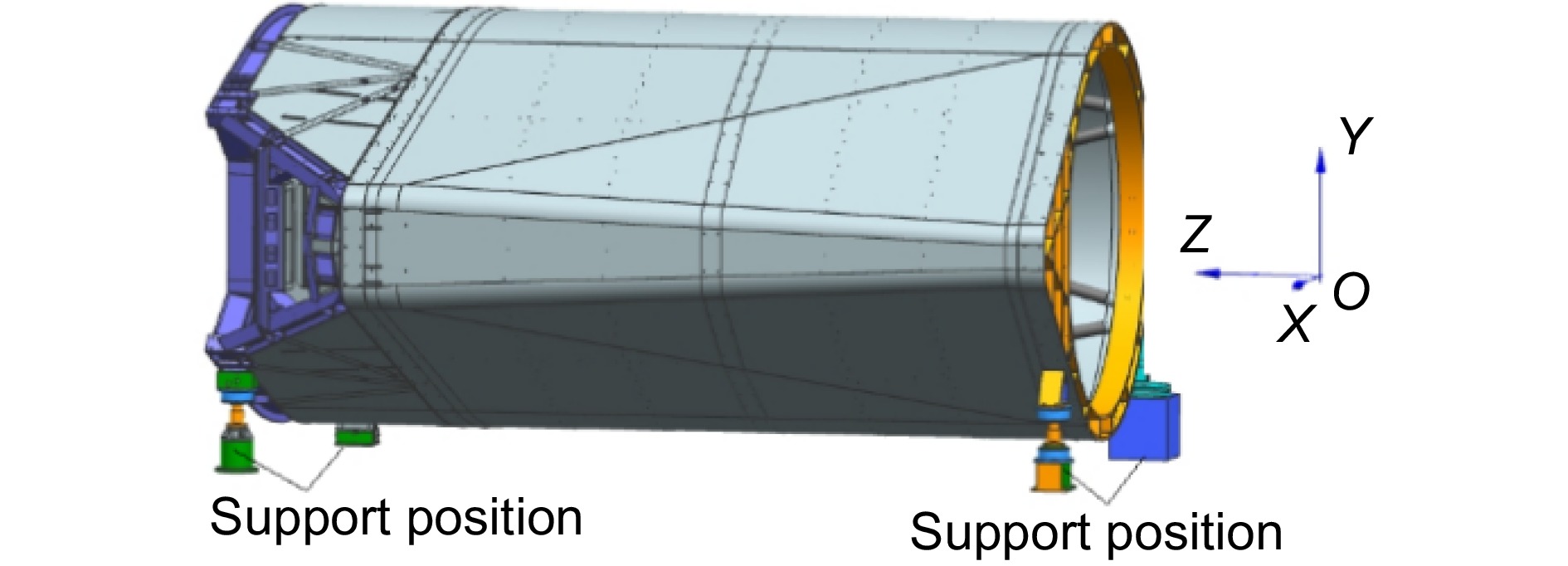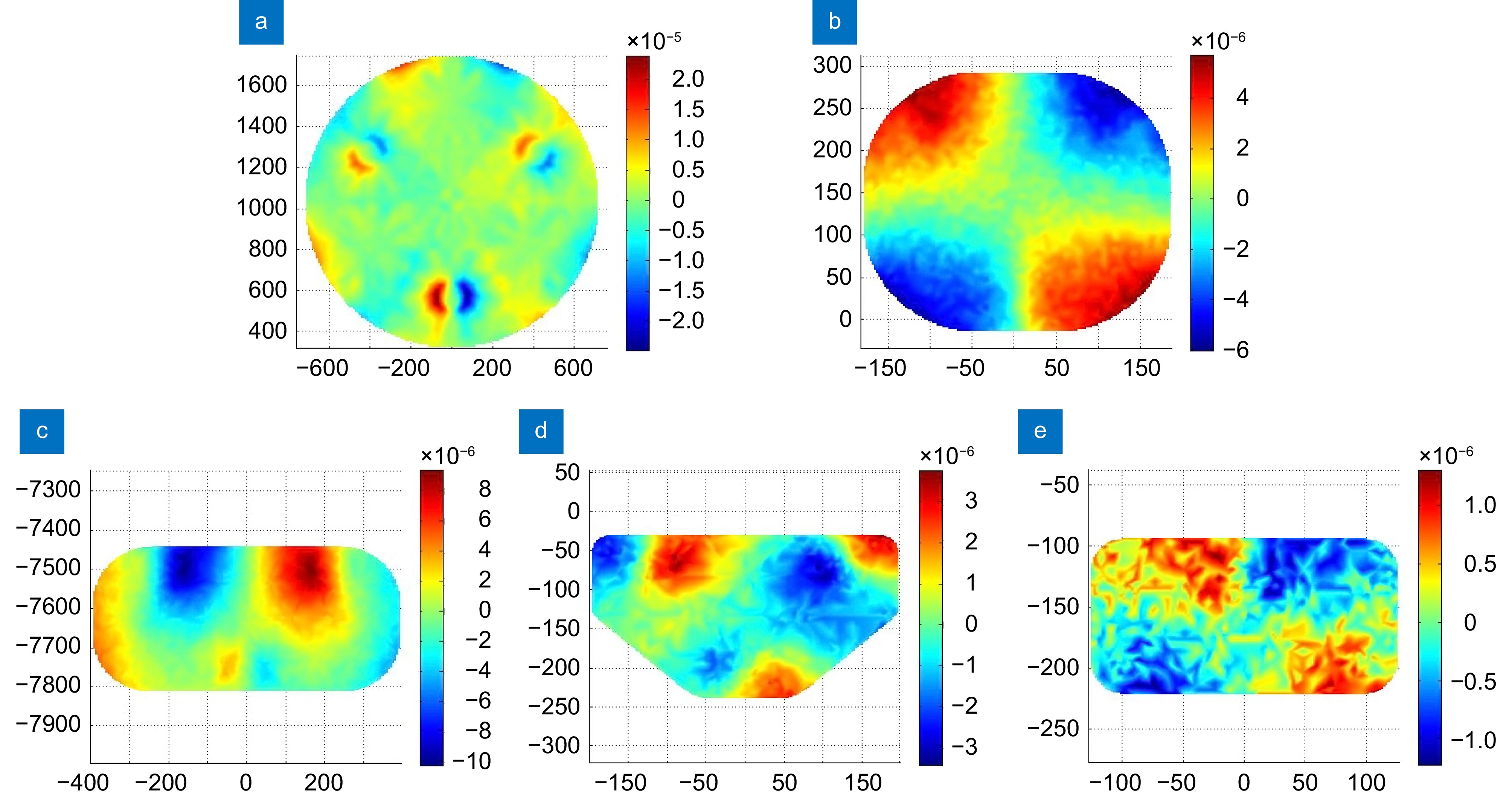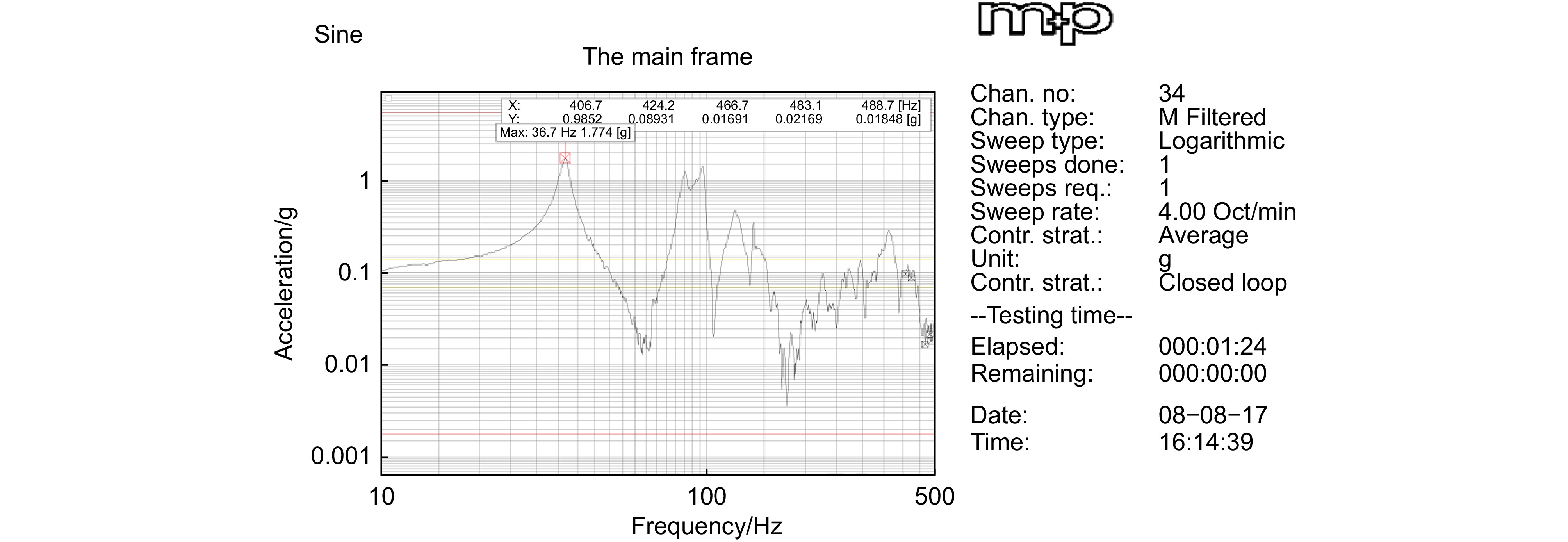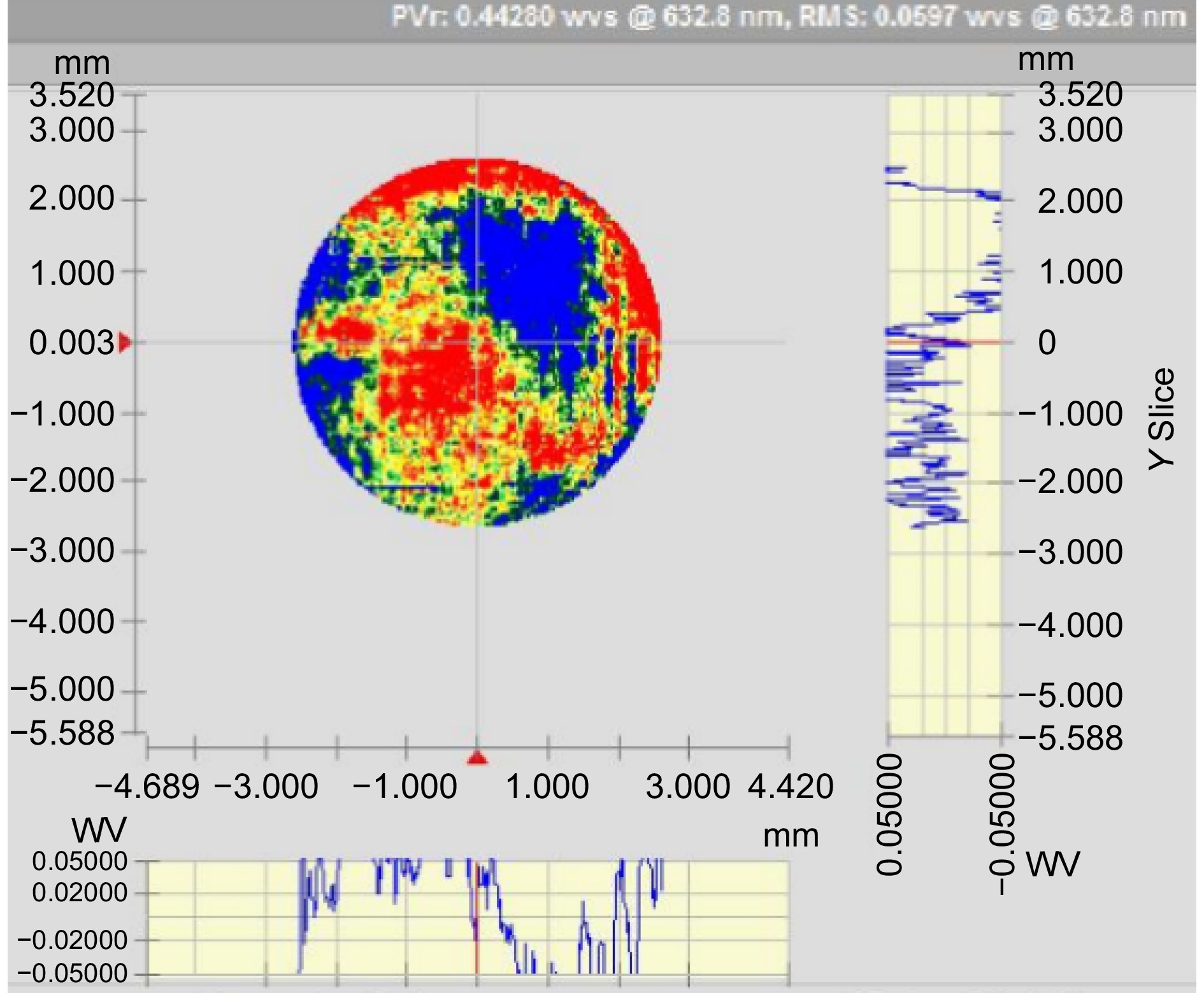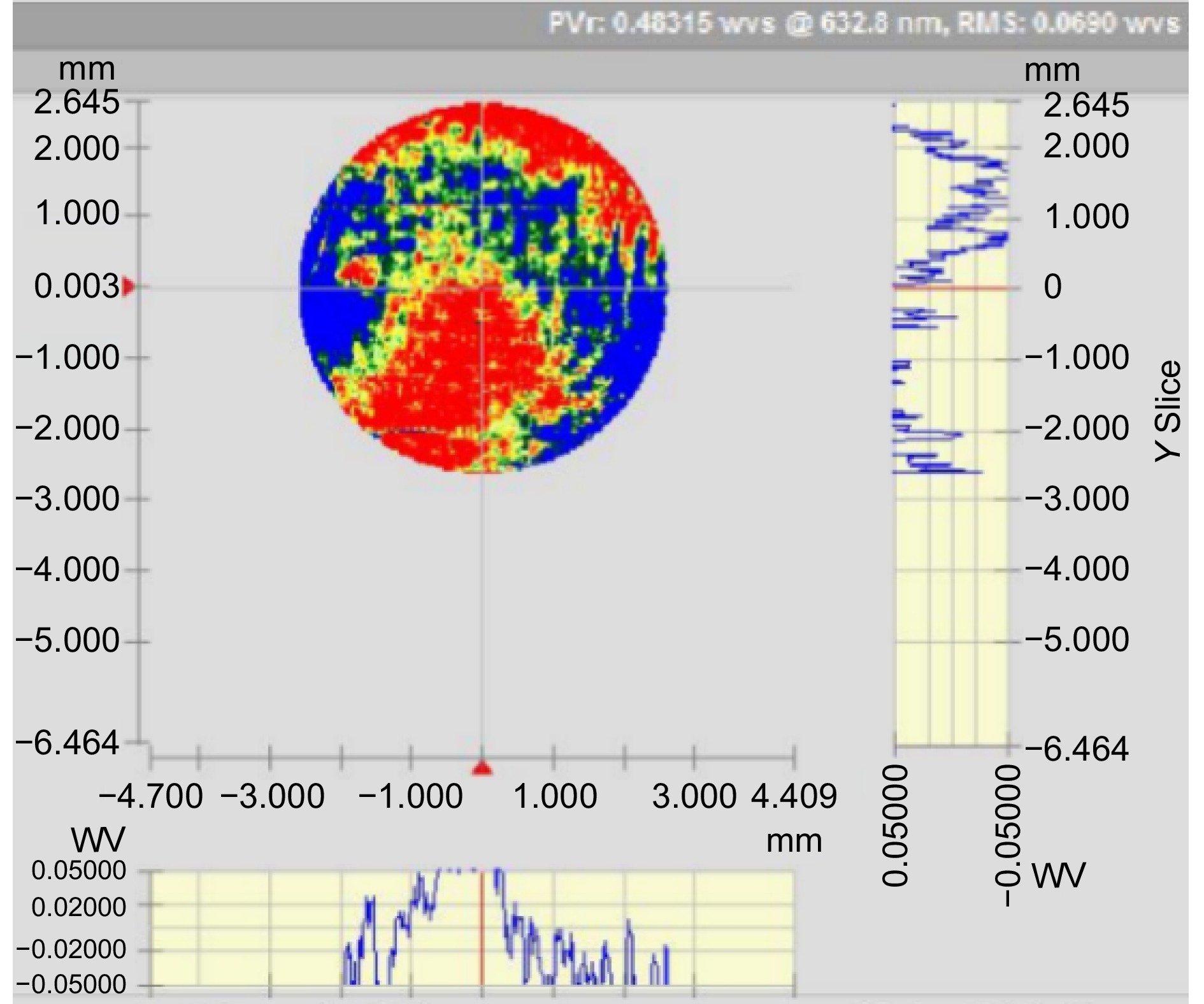-
摘要
针对大口径空间相机成像质量受重力影响的问题,提出了通过调整结构变形量来减小光学系统在轨失调量的结构优化设计方法。首先,在分析某空间相机光学系统特点的基础上,确定了相机主框架和反射镜柔性支撑的结构形式。其次,以减小次镜、三镜、双反镜、调焦镜与主镜在重力作用下的相对刚体位移、相对倾角及面形误差为优化目标,以光学系统对各反射镜的稳定性公差要求为约束条件,得到了主框架桁架杆、承力筒和反射镜柔性支撑结构的最优尺寸。最后,对相机的模态、各反射镜面形进行有限元分析,并对相机进行了正弦扫频试验和系统波像差测试,结果表明相机的一阶频率为36.7 Hz,在装调和翻转180°两种状态下,相机各视场平均波像差分别为0.0655
λ 和0.0701λ (λ =632.8 nm),可以推测,相机入轨重力影响消失后,系统波像差能够满足光学设计要求。该相机支撑结构的优化设计方法可以作为空间相机结构设计的参考。Abstract
A kind of method of structural optimization design using structural deformation to compensate for optical misalignment is presented, which aims at decreasing the affection of imaging by gravity. First, on the basis of the characteristics of the optical system of a space camera, the structural forms of the main frame of the camera and the flexible support structure of the mirrors are determined. Secondly, taking the relative stiffness shift, relative inclination and face shape error of the secondary mirror, tertiary mirror, folding mirror, focusing mirror and main mirror under gravity as the optimization objectives, and the stability tolerance requirement of the optical system for each mirror as the constraints, the optimal parameters of the truss of main frame, the bearing cylinder thickness and the flexible support structure are obtained. Finally, the finite element analysis is carried out on the mode and Surface deformation of the camera, and sinusoidal sweep test and system wave aberration test are carried out on the camera. The results show that the first-order frequency of the camera is 36.7 Hz, and the average wave aberration of each field of the camera is 0.0655
λ and 0.0701λ (λ =632.8 nm) under the two states of loading and flipping 180 degrees, respectively. It can be inferred that the wave aberration of the system can meet the optical design requirements after the gravity effect of the camera is disappeared. The optimized design of the camera support structure can be used as a reference for the structural design of space cameras. -
Overview
Overview: The mounting and test result of space optical camera on the ground is actually the result of the optical system affected by gravity. When the space camera is launched into orbit and working in the space microgravity environment, the gravity deformation of each mirror will rebound and release, resulting in the mirrors deviating from the best position of mounting, causing the optical system to misadjust. The aperture of the camera is larger, the effection of gravity is greater. A kind of method of structural optimization design using structural deformation to compensate for optical misalignment is presented, which aims at decreasing the affection of imaging by gravity. First, on the basis of the characteristics of the optical system of a space camera, the structural forms of the main frame of the camera and the flexible support structure of the mirrors are determined. Secondly, taking the relative stiffness shift, relative inclination and face shape error of the secondary mirror, tertiary mirror, folding mirror, focusing mirror and main mirror under gravity as the optimization objectives, and the stability tolerance requirement of the optical system for each mirror as the constraints, the optimal parameters of the truss of main frame, the bearing cylinder thickness and the flexible support structure are obtained. Finally, the finite element analysis is carried out on the mode and surface deformation of the camera, and sinusoidal sweep test and system wave aberration test are carried out on the camera. The results show that the first-order frequency of the camera is 36.7 Hz; the deformation of each mirror, the translation and rotation of each mirror meet the design requirements. The maximum relative translation between the folding mirror and the primary mirror is -3.4 µm, the maximum relative rotation between the focusing mirror and the primary mirror is 1.7", and the maximum surface deformation of the focusing mirror is 6.6 nm (root mean square). Under the two states of mounting and flipping 180 degrees, the average wave aberration of each field of the camera is 0.0655λ and 0.0701λ (λ=632.8 nm), respectively. It can be inferred that the wave aberration of the system can meet the optical design requirements after the gravity effect of the camera is disappeared. The optimized design of the camera support structure can be used as a reference for the structural design of space cameras.
-

-
表 1 光学系统稳定性公差
Table 1. The stability tolerance of optical system
Mirror Translation tolerance under xyz/mm Rotation tolerance under xyz/(″) Deformation of mirror X Y Z X Y Z Primary mirror Datum Datum Datum Datum Datum Datum RMS≤λ/50
(λ=632.8 nm)Secondary mirror 0.02 0.03 0.050 6 4 20 Tertiary mirror 0.15 0.15 0.015 18 18 36 Folding mirror / / 0.015 18 18 / Focusing mirror / / / 20 20 / 表 2 空间结构材料特性对比
Table 2. Comparison of material properties for space structures
Property LY12 TC4 ZTC4 M40 SiCp/Al Density ρ/(g/cm3) 2.80 4.44 4.40 1.60 2.95 Elastic modulus E/GPa 71 109 114 145 180 Thermal conductivity K/(W/m·℃) 120 6.8 8.8 0-3 235 Thermal expansion coefficient α/(10−6/℃) 22.7 9.10 8.90 −1 8.00 Specific stiffness E/ρ 25.4 24.5 25.9 5.28 60.0 Thermal stability K/α 5.92 9.10 9.88 −3-0 29.38 表 3 主框架主要尺寸优化结果
Table 3. The main dimensions optimization results of main frame
Optimization parameter Optimization results Truss configuration Fig. 2 Inside diameter of truss d/mm 47 Outside diameter of truss D/mm 55 Truss length ln (n=1,2,3…)/mm 1270-1385 Bearing cylinder thickness t/mm 1.8 表 4 反射镜柔性支撑主要尺寸优化结果
Table 4. The main dimensions optimization results of flexible support
Flexible structural parameter L1/mm L2/mm H/mm B/mm Primary mirror 110.0 70.0 100.0 6.0 Secondary mirror 49.0 32.8 36.6 2.9 Tertiary mirror 73.5 53.3 62.5 4.3 Folding mirror 50.0 34.1 36.5 3.1 Focusing mirror 30.0 20.4 27.0 2.2 表 5 相机模态分析结果
Table 5. Modal analysis result of the camera
Order Frequency/Hz Mode shapes 1 36.5 Move along Y-axis 2 40.7 Move along X-axis 3 87.1 Local vibration of front frame 表 6 相机装调状态重力作用下各反射镜与主镜的相对刚体位移和倾角变化
Table 6. The translation and rotation of other mirror compared with primary mirror in -Y direction
Mirror Translation/µm Rotation/(″) PV/nm RMS/nm ΔX ΔY ΔZ θx θy θz Primary mirror 0 0 0 0 0 0 34.4 6.2 Secondary mirror −2.8 0.4 2.0 0.7 1.4 −1.3 18.3 3.2 Tertiary mirror −1.5 −0.1 0.8 −0.5 1.6 −1.4 19.7 3.6 Folding mirror −3.4 0.4 1.1 −0.2 −0.3 1.6 21.1 4.1 Focusing mirror −3.1 0.4 1.3 0.2 1.7 1.1 35.1 6.6 表 7 相机波像差测试结果
Table 7. The test results of camera wave aberration
Field of view −1.0 −0.5 0 0.5 1.0 Average Test results in -Y/λ 0.0686 0.0695 0.0597 0.0612 0.0687 0.0655 Test results in Y/λ 0.0726 0.0745 0.0690 0.0637 0.0706 0.0701 -
参考文献
[1] 张学军, 樊延超, 鲍赫, 等. 超大口径空间光学遥感器的应用和发展[J]. 光学 精密工程, 2016, 24(11): 2613−2626. doi: 10.3788/OPE.20162411.2613
Zhang X J, Fan Y C, Bao H, et al. Applications and development of ultra large aperture space optical remote sensors[J]. Opt Precision Eng, 2016, 24(11): 2613−2626. doi: 10.3788/OPE.20162411.2613
[2] 朱仁璋, 丛云天, 王鸿芳, 等. 全球高分光学星概述(一): 美国和加拿大[J]. 航天器工程, 2015, 24(6): 85−106. doi: 10.3969/j.issn.1673-8748.2015.06.015
Zhu R Z, Cong Y T, Wang H F, et al. Global high-resolution optical satellite overview (1): USA and Canada[J]. Spacecr Eng, 2015, 24(6): 85−106. doi: 10.3969/j.issn.1673-8748.2015.06.015
[3] 卢刚, 高磊, 王彦敏. 高景一号影像多方法融合效果评价分析[J]. 遥感信息, 2018, 33(6): 124−131. doi: 10.3969/j.issn.1000-3177.2018.06.018
Lu G, Gao L, Wang Y M. Evaluation and analysis on multiple fusion methods for GJ-1 satellite imagery[J]. Remote Sens Inf, 2018, 33(6): 124−131. doi: 10.3969/j.issn.1000-3177.2018.06.018
[4] 徐伟, 金光, 王家骐. 吉林一号轻型高分辨率遥感卫星光学成像技术[J]. 光学 精密工程, 2017, 25(8): 1969−1978. doi: 10.3788/OPE.20172508.1969
Xu W, Jin G, Wang J Q. Optical imaging technology of JL-1 lightweight high resolution multispectral remote sensing satellite[J]. Opt Precision Eng, 2017, 25(8): 1969−1978. doi: 10.3788/OPE.20172508.1969
[5] 李玲, 赵野. 大口径空间相机地面装调时的重力卸载方法[J]. 航天返回与遥感, 2016, 37(5): 69−76. doi: 10.3969/j.issn.1009-8518.2016.05.008
Li L, Zhao Y. A gravity unloading method of on-ground alignment for large aperture remote sensor[J]. Spacecr Recovery Remote Sens, 2016, 37(5): 69−76. doi: 10.3969/j.issn.1009-8518.2016.05.008
[6] 何煦, 杨雪, 李颐, 等. 大口径空间光学望远镜重力卸载点布局优化方法[J]. 光学 精密工程, 2018, 26(11): 2764−2775. doi: 10.3788/OPE.20182611.2764
He X, Yang X, Li Y, et al. Gravity compensation optimization algorithm for large aperture spatial optical telescope[J]. Opt Precision Eng, 2018, 26(11): 2764−2775. doi: 10.3788/OPE.20182611.2764
[7] 孙熠璇, 罗世魁, 高超, 等. 大口径空间反射镜的重力卸载优化方法[J]. 红外与激光工程, 2021, 50(1): 20200103. doi: 10.3788/IRLA20200103
Sun Y X, Luo S K, Gao C, et al. Optimization method for large-aperture space mirror’s gravity unload[J]. Infrared and Laser Engineering, 2021, 50(1): 20200103. doi: 10.3788/IRLA20200103
[8] Han O, Kienholz D, Janzen P, et al. Gravity-offloading system for large-displacement ground testing of spacecraft mechanisms[C]//Proceedings of the 40th Aerospace Mechanisms Symposium, 2010: 119–132.
[9] 白杰, 孙熠璇, 刘子嘉, 等. 空间相机地面装调重力卸载仿真优化方法[J]. 航天器环境工程, 2021, 38(4): 401−406. doi: 10.12126/see.2021.04.004
Bai J, Sun Y X, Liu Z J, et al. An optimization method for simulation of gravity unloading of ground-mounted space camera[J]. Spacecr Environ Eng, 2021, 38(4): 401−406. doi: 10.12126/see.2021.04.004
[10] Chaney D M, Hadaway J B, Lewis J A, et al. Cryogenic radius of curvature matching for the JWST primary mirror segments[J]. Astron Space Opt Syst, 2009, 7439: 743916. doi: 10.1117/12.845115
[11] 宋伟阳, 解鹏, 王循. 大型空间离轴三反相机分体支撑结构设计[J]. 光学 精密工程, 2021, 29(3): 571−581. doi: 10.37188/OPE.20212903.0571
Song W Y, Xie P, Wang X. Design of lightweight split support structure for large space off-axis three mirror camera[J]. Opt Precision Eng, 2021, 29(3): 571−581. doi: 10.37188/OPE.20212903.0571
[12] 席佳利, 张雷, 解鹏, 等. 离轴三反空间相机主支撑结构优化设计与试验[J]. 光电工程, 2016, 43(7): 45−51. doi: 10.3969/j.issn.1003-501X.2016.07.008
Xi J L, Zhang L, Xie P, et al. Optimization design and test of the supporting structure for the off-axis three-mirror reflective space camera[J]. Opto-Electron Eng, 2016, 43(7): 45−51. doi: 10.3969/j.issn.1003-501X.2016.07.008
[13] 李博宏, 罗健, 丘敏艳, 等. 引力波探测望远镜超低热变形桁架支撑结构设计技术[J]. 光电工程, 2023, 50(11): 230155. doi: 10.12086/oee.2023.230155
Li B H, Luo J, Qiu M Y, et al. Design technology of the truss support structure of the ultra-low thermal deformation gravitational wave detection telescope[J]. Opto-Electron Eng, 2023, 50(11): 230155. doi: 10.12086/oee.2023.230155
[14] 胡守伟, 张勇, 王跃飞, 等. 三十米中国未来巨型望远镜主桁架结构的概念设计[J]. 光电工程, 2022, 49(6): 210402. doi: 10.12086/oee.2022.210402
Hu S W, Zhang Y, Wang Y F, et al. Concept design for the main structure of 30 m Chinese Future Giant Telescope[J]. Opto-Electron Eng, 2022, 49(6): 210402. doi: 10.12086/oee.2022.210402
[15] 郭疆, 朱磊, 赵继, 等. 大口径空间反射镜大容差支撑结构设计与优化[J]. 光学 精密工程, 2019, 27(5): 1138−1147. doi: 10.3788/OPE.20192705.1138
Guo J, Zhu L, Zhao J, et al. Design and optimize of high tolerance support structure for large aperture space mirror[J]. Opt Precision Eng, 2019, 27(5): 1138−1147. doi: 10.3788/OPE.20192705.1138
[16] Yoder P R. 光机系统设计[M]. 周海宪, 程云芳, 译. 北京. 机械工业出版社, 2008.
Yoder P R. Opto-Mechanical Systems Design[M]. Zhou H X, Cheng Y F, trans. Beijing: China Machine Press, 2008.
[17] 高强, 吴艳红, 栾金择, 等. 正弦扫频速率对结构响应的影响分析[J]. 航天器环境工程, 2020, 37(3): 250−257. doi: 10.12126/see.2020.03.007
Gao Q, Wu Y H, Luan J Z, et al. The influence of sweep rate on the structure responses of sine-sweep excitations[J]. Spacecr Environ Eng, 2020, 37(3): 250−257. doi: 10.12126/see.2020.03.007
[18] 梁醒培, 王辉. 基于有限元法的结构优化设计: 原理与工程应用[M]. 北京: 清华大学出版社, 2010: 1–3.
Liang X P, Wang H. Structural Optimization: Principles and Engineering Applications[M]. Beijing: Tsinghua University Press, 2010: 1–3.
[19] Wang Z S, Zhang J X, Wang J X, et al. A back propagation neural network based optimizing model of space-based large mirror structure[J]. Optik, 2019, 179: 780−786. doi: 10.1016/j.ijleo.2018.09.161
-
访问统计

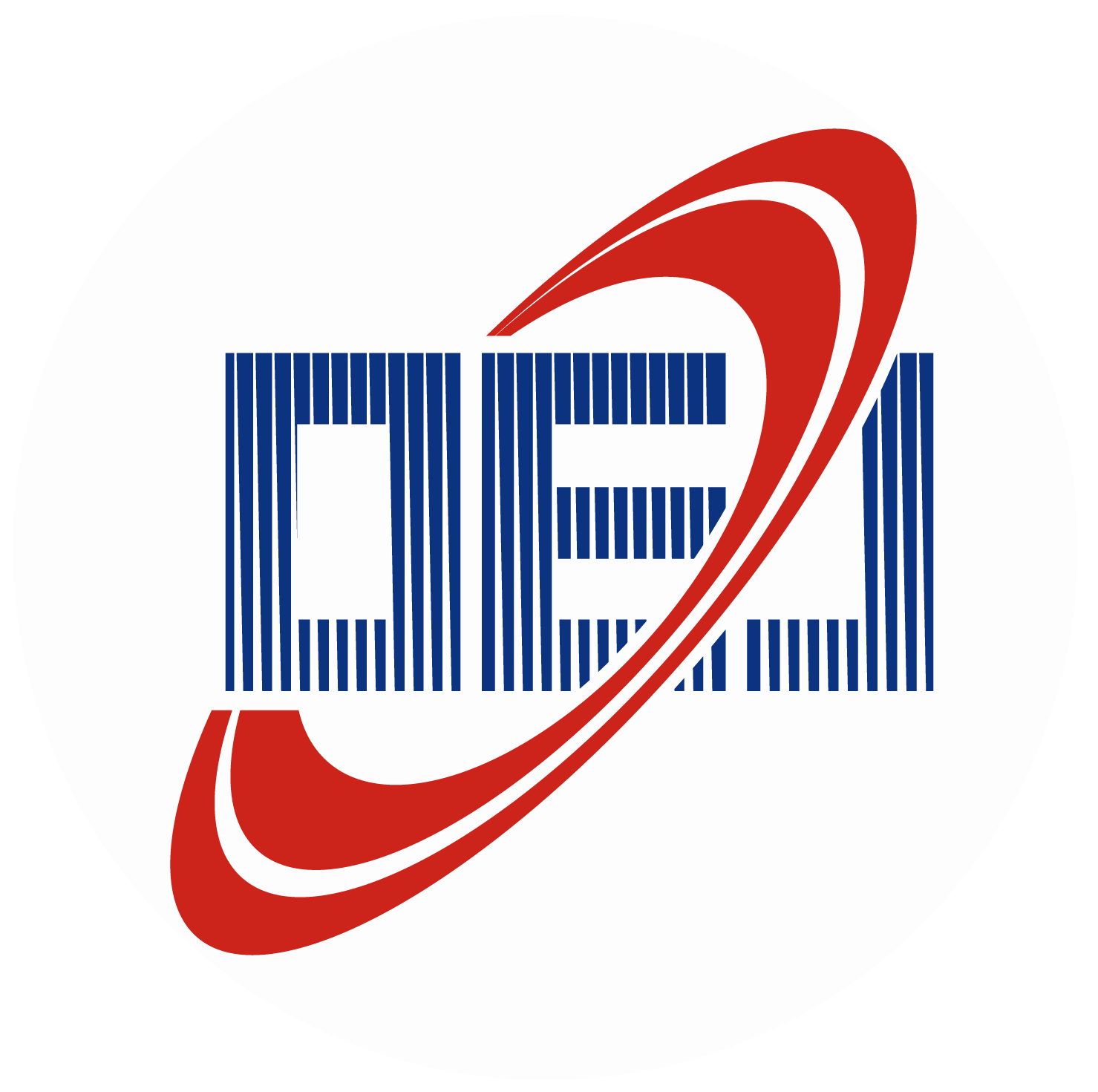
 E-mail Alert
E-mail Alert RSS
RSS
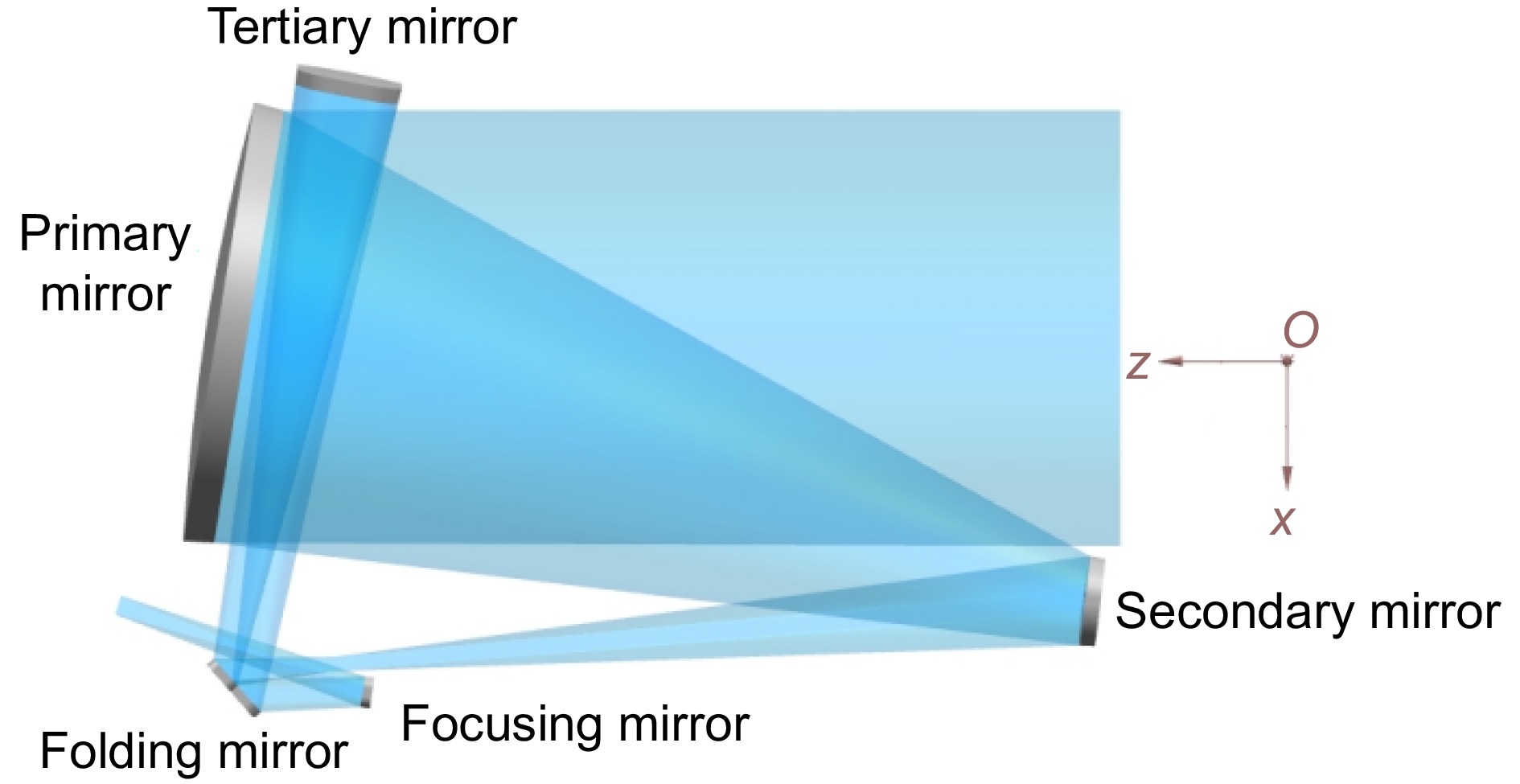
 下载:
下载:

